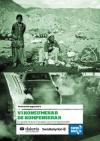Vi konsumerar de kompenserar : En granskning av Sveriges köp av utsläppskrediter

| Upphovsperson: | Cosnier, Maria |
|---|---|
| Utgivare: | Swedwatch | Svenska Kyrkan |
| Tidskrift/källa: | Swedwatch Report |
| År: | 2012 |
| Ämnesord: | Indien, Globalisation, Energi, Hållbar utveckling, Klimat och klimatförändringar |
Sverige ska minska sina utsläpp av växthusgaser med ungefär 20 miljoner ton per år. En tredjedel av minskningen ska ske genom köp av utsläppskrediter, främst genom FN:s klimatkompensationsprogram CDM, Clean Development Mechanism. I Sverige ansvarar Energimyndigheten för statens köp av utsläppskrediter. Detta sker direkt i ett enskilt projekt i ett utvecklingsland (bilateralt) eller genom fonder (multilateralt). I rapporten Vi konsumerar de, de kompenserar granskas ett av de många projekt som Sverige, genom Energimyndigheten, i framtiden kommer att köpta utsläppskrediter ifrån. Det handlar om ett vattenkraftsprojekt i Rampur i norra Indien som ingår i en fond administrerad av Världsbanken.
Rapporten visar att det finns frågetecken kring hållbarheten, den lokala förankringen och arbetsvillkoren vid projektet i norra Indien. Bygget har haft en negativ påverkan på skördar och vattenkällor. Lokalbefolkningen uppger i intervjuer att utlovade arbetstillfällen saknas och att de inte har fått kompensation fullt ut för problem som uppstått i samband med bygget av kraftverket.
Alla projekt i FN:s klimathandel måste vara additionella. Det innebär att det ska gå att visa att projekten inte hade kommit igång utan ekonomiskt tillskott från CDM-systemet. Studien visar att det är tveksamt om bygget av vattenkraftverket i Indien uppfyllt kravet på additionalitet.
Rapporten tydliggör tre problem med Sveriges satsning på klimatkompensation: tveksamheter kring additionalitet, hållbar utveckling och bristande ansvarstagande hos vissa fondförvaltare.
Swedwatch riktar följande rekommendationer i rapporten:
Sverige bör genomföra en större andel av utsläppsminskningarna på hemmaplan.
Svenska CDM-investeringar bör i större utsträckning genomföras i egen regi än fonder.
Regeringen bör säkerställa att investeringarna görs på ett hållbart, transparent och inkluderande sätt.
Regeringen bör uppdra åt Energimyndigheten att återrapportera alla CDM-investeringars klimatnytta och lokala påverkan på miljö och människor.
Läs sammanfattning på engelska